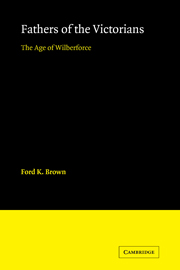12 - Frankenstein; or, The Modern Prometheus
Published online by Cambridge University Press: 11 March 2010
Summary
The Christian Observer's review of Robert Isaac and Samuel Wilberforce's life of their father began immediately after it came out, in the issue of June 1838. The editor ‘could not permit a single month to go by’ without placing the young Wilberforces' title page on his list; he therefore squeezed in two or three pages of a forty-page review the rest of which appeared in September and December. This first instalment thus served only as a hurried introduction to the notice of ‘those already popular and highly-appreciated volumes’ with ‘their delightful and valuable contents’. It had no comment except of a general nature, such as the statement that Zachary Macaulay, who ‘did not live to read the memoir of his beloved friend’, furnished most of the materials apart from Wilberforce's diary and journals, and it seems certain that in June the Christian Observer had not read the book. They knew without reading that its contents would be delightful and valuable.
By September it had been read, in so far as its nature permitted it to be done in so short a time by so simple-hearted a reader. We come then to the beginning of one of the strangest reviews ever published. For a while the writer struggles with the incomprehensible conflict, the dimensions of which he never grasps, between what he is reading and what he knows to be the truth, his natural feeling of reverence for the great leader heightening his feeling of the impossibility of Wilberforce's sons doing what they seemed to have done. In this struggle simple piety and Christian ingenuousness prove unequal to the task, and the reviewer gives up, in disappointment and bewilderment.
- Type
- Chapter
- Information
- Fathers of the VictoriansThe Age of Wilberforce, pp. 487 - 533Publisher: Cambridge University PressPrint publication year: 1961



